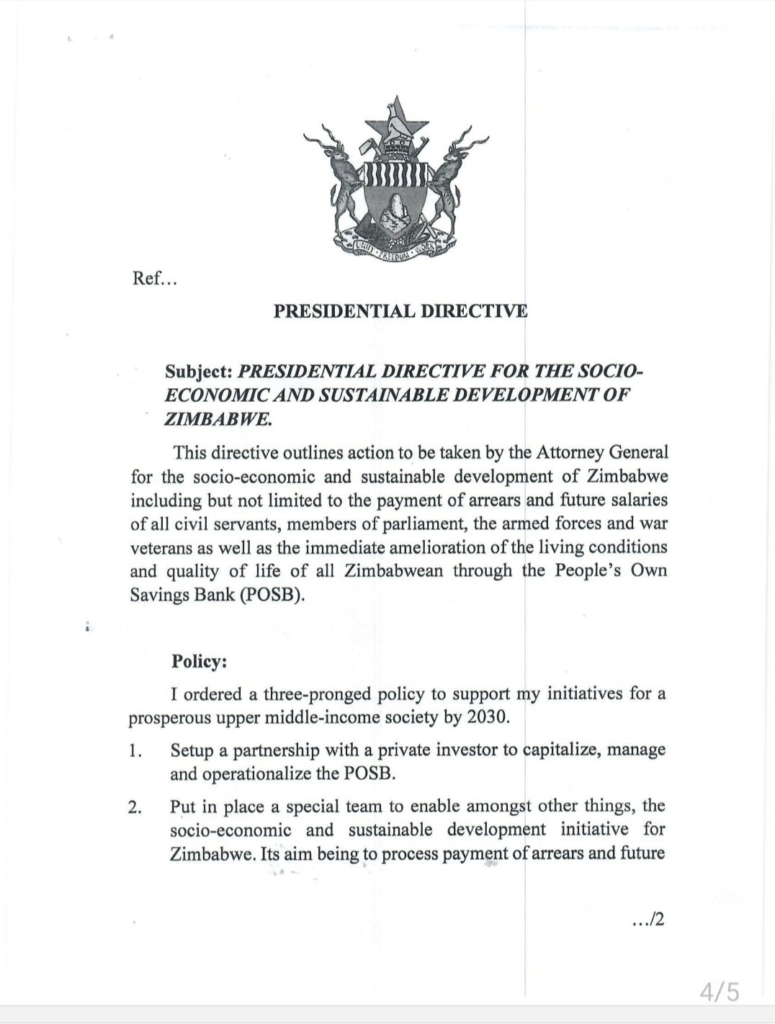POSB Heist: Mnangagwa’s Illegal Sale of a National Asset

The scandal surrounding the sale of the People’s Own Savings Bank (POSB) to the shadowy Hebrew Investment Group (HIG) is yet another clear example of the ZANU PF regime’s lawlessness, corruption, and disregard for Zimbabweans. Despite Attorney-General Virginia Mabiza’s letters, President Emmerson Mnangagwa’s directive, and widespread insider concerns, the necessary legal procedures were blatantly ignored, exposing this deal as an unlawful and brazen heist.
The deal involves a US$100 million sale of the bank—an institution responsible for processing civil servants’ salaries—to a virtually unknown outfit, HIG. In return, the government was set to receive a US$6 billion loan. However, insiders have dismissed this as a money-laundering scheme disguised as an investment deal. The sheer scale of this operation is not only shocking but raises serious concerns about the systematic plundering of Zimbabwe’s public assets under the cover of darkness.
Under Zimbabwean law, selling a public asset must follow a clear process to prevent corruption and ensure that national resources are not stolen by political elites. The Public Procurement and Disposal of Public Assets Act [Chapter 22:23] mandates a transparent tendering system, requiring a shareholders’ agreement, board approval, and competitive bidding. None of these steps were followed in the POSB sale. Instead, the deal was rushed through in secrecy, sidelining institutions designed to ensure fairness and protect public assets from being looted.
A shareholders’ agreement is a critical legal document that outlines how decisions—such as the sale of a state-owned enterprise—must be made. This agreement was never presented or signed in this case. The board of directors, which is legally responsible for approving such transactions, was also bypassed. Most alarmingly, the Procurement Regulatory Authority of Zimbabwe (PRAZ) and the Special Procurement Oversight Committee, which are meant to oversee public procurement and ensure compliance with the law, were ignored entirely. By doing so, the Mnangagwa administration has made it clear that legal processes are nothing more than obstacles to their grand looting schemes.
The sale of public assets must be conducted in an open and competitive manner to ensure Zimbabwe gets the best deal. A transparent tendering process is not just a legal requirement but a necessity to prevent the kind of corruption that has crippled the country for decades. There was no formal tender for POSB—no advertisements, no bids, and no competition. Instead, Mnangagwa’s government handpicked HIG, an entity with no known financial track record, to take over a strategic national asset. This is the very definition of state capture—a small elite exploiting public institutions for personal enrichment.
For years, ZANU PF has perfected the art of siphoning national wealth while using propaganda to cover up its crimes. The sale of POSB is a continuation of this trend—a daylight robbery that will leave ordinary Zimbabweans paying the price. Civil servants, whose salaries are processed through the bank, now face the risk of financial instability as their funds are placed in the hands of an unknown foreign entity. Zimbabweans have every right to ask: Who really owns HIG? What deals have been struck behind closed doors? Who is benefitting from this sale?
This is not just a case of incompetence; it is a deliberate act of economic sabotage. The same government that claims to be working for the people is auctioning national assets without accountability. The same leadership that speaks of economic recovery is driving the country deeper into financial ruin through corrupt deals that benefit only a handful of politically connected individuals.
Mnangagwa and his cronies must be held accountable. Zimbabweans cannot afford to sit back as public resources are stolen under the guise of investment. The sale of POSB is illegal, illegitimate, and must be reversed. If this deal is allowed to proceed, it will set a dangerous precedent where national assets can be sold off to the highest bidder in backroom deals.
This scandal is not just about POSB—it is about the future of Zimbabwe. It is about whether Zimbabweans will allow their resources to be stolen in broad daylight or whether they will rise and demand accountability. Mnangagwa’s government has shown that it has no regard for the law, no respect for transparency, and no interest in protecting national interests. The question now is: Will Zimbabweans allow this heist to happen?




